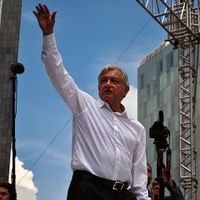Tepetitán (México), 1953
By Fernando Antonio da Costa Vieira
 A politician from the state of Tabasco, he chaired the local Institutional Revolutionary Party (PRI) and later the Party of the Democratic Revolution (PRD). He began his career by leading the Indigenous Institute (1977) and then also headed the National Consumer Institute (1984). He supported Cuauhtémoc Cárdenas Solárzano in the 1988 elections and was involved in the founding of the PRD in 1989.
A politician from the state of Tabasco, he chaired the local Institutional Revolutionary Party (PRI) and later the Party of the Democratic Revolution (PRD). He began his career by leading the Indigenous Institute (1977) and then also headed the National Consumer Institute (1984). He supported Cuauhtémoc Cárdenas Solárzano in the 1988 elections and was involved in the founding of the PRD in 1989.
In 2000, he ran for and won the election for the Head of Government of the Federal District, defeating Santiago Creel, the candidate of the National Action Party (PAN), and Jesús Silva Herzog Flores of the PRI. The election was marked by strong opposition contesting his legitimacy, arguing that his election was invalid because he did not reside in the capital.
Building an image of frugality and political moderation, López Obrador united both the popular sectors and a significant portion of the middle class. He adopted a policy of social inclusion, leading the government of the Federal District to launch policies aimed at improving public education and health. He also initiated important reforms in the security agencies to combat corruption and police violence. Additionally, he sought to implement urban renewal policies, modernizing the Mexican capital, especially those that involved improvements to the city’s chaotic traffic.
Despite reducing certain crime rates, López Obrador was cornered by a wave of kidnappings that plagued Mexico City between 2003 and 2005. The sense of insecurity was compounded by legal disputes initiated by the opposition, particularly the “Desaforo Process” (2004-2005), which dealt with his disobedience to a court order challenging an expropriation carried out by his predecessor in office.
Efforts to remove López Obrador were rejected, although between April 8 and 25, 2005, he was temporarily removed from the Head of Government position after having his political rights suspended. He was reinstated due to a court order and popular pressure, and after Cuauhtémoc Cárdenas’ refusal, he launched his candidacy for the 2006 presidential elections.
On July 29, 2005, he resigned from his position to begin the election campaign as a pre-candidate for the PRD. Adopting a clear left-wing stance, Obrador questioned the political and economic practices of the PRI and the PAN. He also sought to build a left-wing alliance to support his candidacy. One of the obstacles to forming this left-wing coalition was the position of the Zapatistas, who questioned his ability to implement a platform tied to social causes. Despite his strong popular base, he lost the election (with a contested result) to Felipe Calderón. He ran for president again in 2012, an election won by Peña Nieto.


